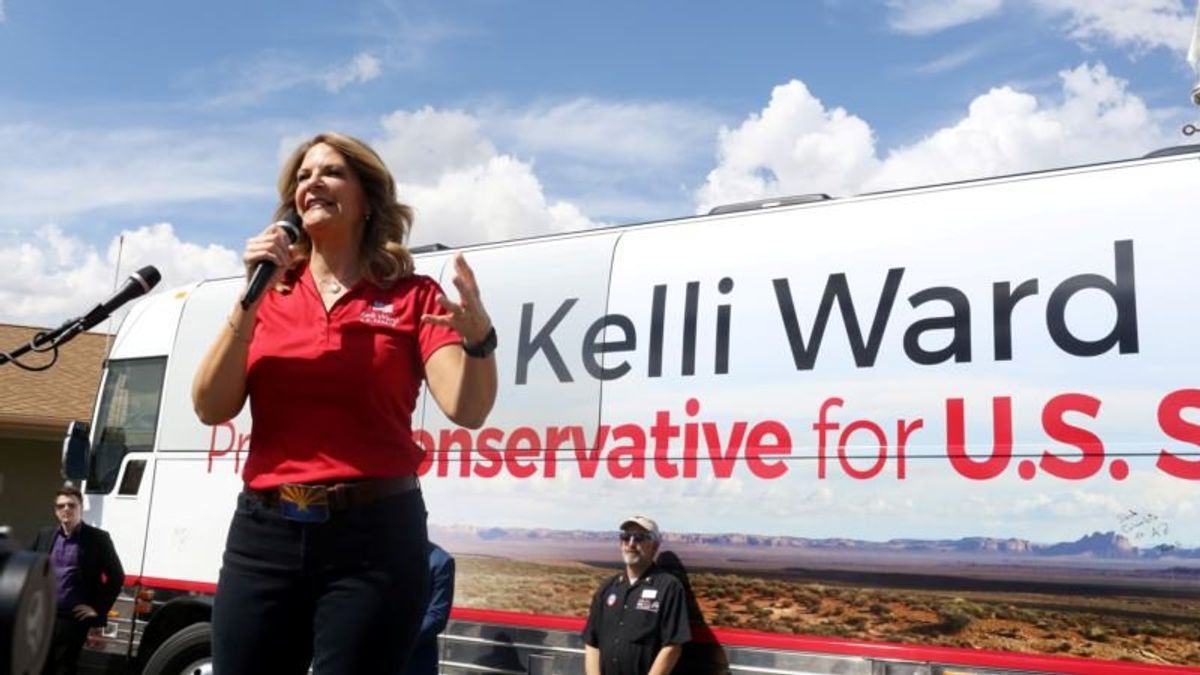
In US Senate Primary, Arizona Republicans Compete Over Who Loves Trump Most
In US Senate Primary, Arizona Republicans Compete Over Who Loves Trump Most

A contentious three-way U.S. Senate battle in Arizona on Tuesday among Republicans fighting to prove the depth of their allegiance to President Donald Trump tops the last big day of state nominating contests before November's elections.
Voters there and in Florida were heading to the polls to pick candidates for Nov. 6, when Democrats will try to pick up 23 seats in the U.S. House of Representatives and two seats in the Senate to gain majorities and slam the brakes on Trump's legislative agenda.
In Arizona, a Southwestern state that Trump won by 4 percentage points in the 2016 White House race, Republican establishment favorite U.S. Representative Martha McSally has led consistently in opinion polls over former state Senator Kelli Ward and former Maricopa County Sheriff Joe Arpaio.
The contest could be critical to the balance of power in the Senate in November because the Arizona seat of retiring Republican Jeff Flake, a Trump critic, is considered one of the two top takeover targets for Democrats, along with Nevada.

McSally is seen as a stronger general election candidate than either Ward or Arpaio, both hard-line conservatives.
McSally has already launched advertising aimed at her likely Democratic opponent in November, U.S. Representative Kyrsten Sinema.
Polls have shown Sinema with narrow leads over McSally and a wider gap between her and the other two candidates.
But the race to embrace the polarizing Trump could make it harder in November for the Republican winner. All three have fought over who is closest to Trump and most enthusiastic about his agenda, highlighting the praise Trump has offered them over the past few years.

McSally boasts she has been invited to the White House for movie screenings, and many of Ward's events feature life-sized cardboard cutouts of Trump. Arpaio, who built a national reputation as an immigration hard-liner, won a pardon from Trump after he was convicted of criminal contempt in a case involving racial profiling.
"The entire campaign has been defined by the effort to show who is the better, more enthusiastic supporter of the president," said Stan Barnes, a veteran Republican strategist in Arizona. Trump has not endorsed any of the three Republicans.
McCain's Death Overshadows Race
The contest has been overshadowed in recent days by the death of John McCain, Arizona's longtime Republican senator, on Saturday. All three Republicans had distanced themselves from McCain, who frequently feuded with Trump, and Ward suggested that his family's announcement on Friday that he was stopping medical treatment was timed to hurt her campaign.

McCain's death narrowed the number of Republican-held seats in the 100-member U.S. Senate to 50, with Democrats controlling 49. Republican Arizona Governor Doug Ducey will appoint a member of his own party to succeed McCain.
Florida Primary
Control of the Senate could also be determined by the November Senate race in Florida, which will pit term-limited Republican Governor Rick Scott against incumbent Democrat Bill Nelson. Polls have shown a close race. Scott faces only token opposition in Tuesday's primary; Nelson is unopposed.
Trump has waded into Florida's hotly contested Republican gubernatorial primary, endorsing conservative U.S. Representative Ron DeSantis over Adam Putnam, the state agriculture commissioner and a former U.S. congressman. On Tuesday, Trump reiterated his support for DeSantis in a tweet.
DeSantis, who aired a campaign ad showing him urging his toddler daughter to "build that wall" with toy blocks, now leads in polls.

Trump carried Florida by just over 1 percentage point in 2016.
The Republican winner will face whoever emerges from a crowded Democratic gubernatorial primary field led by moderate former U.S. Representative Gwen Graham, the daughter of Bob Graham, a former Florida governor and U.S. senator.
Graham's top challengers include former Miami Beach Mayor Philip Levine and Tallahassee Mayor Andrew Gillum, a progressive favorite endorsed by U.S. Senator Bernie Sanders.
As with other states throughout this election cycle, early turnout has been strong. More than 1.9 million Florida voters have already cast absentee ballots or voted early, according to the state's Division of Elections, surpassing early voting in state primaries in 2014 and 2016.
Both Arizona and Florida were holding primaries for several competitive U.S. House races that could prove crucial for the Democrats' chances to take control of the House. Democrats see several Republican-held districts in South Florida as prime opportunities to pick up seats.
Oklahoma Runoff
In addition, Oklahoma is holding a primary runoff Tuesday to determine the Republican nominee for governor, as no candidate hit the 50 percent threshold needed to advance to the general election in the June primary. Democrats have already nominated Drew Edmondson, former state attorney general.
After Tuesday's primaries, only five states remain to pick candidates before full attention turns to the November election, when all 435 House seats, 35 Senate seats and 36 governors' offices will be at stake.
 US Envoy Haley Questions Palestinian Refugee NumbersNext PostUS to Continue Backing Saudi Coalition in Yemen War
US Envoy Haley Questions Palestinian Refugee NumbersNext PostUS to Continue Backing Saudi Coalition in Yemen War







